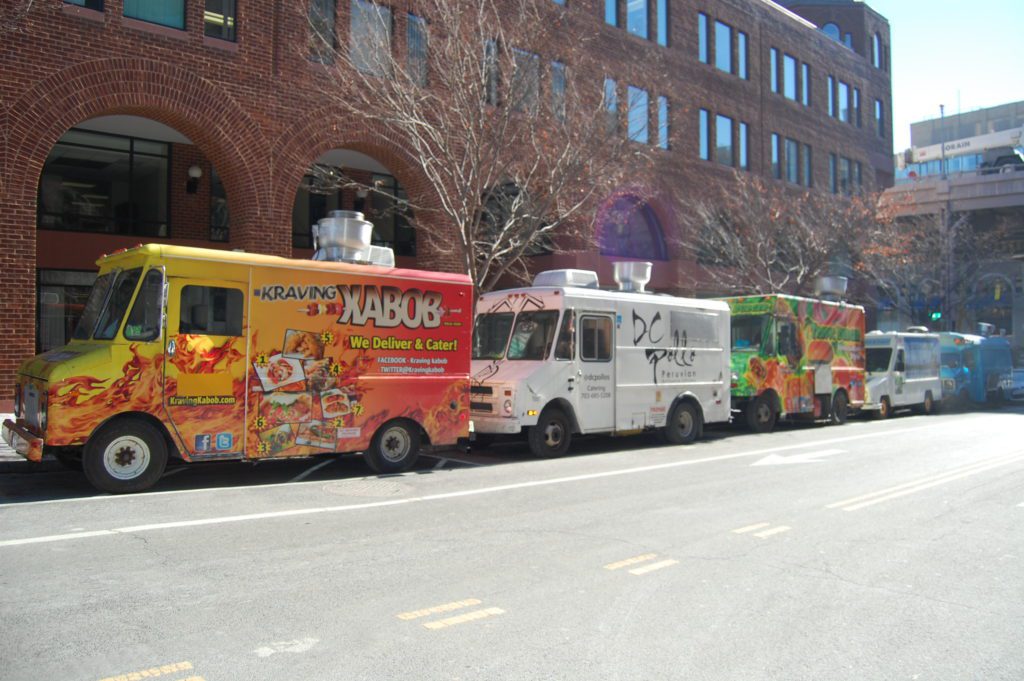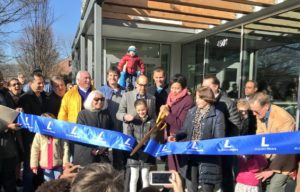Town Topics Jan. 24, 2018
By • January 24, 2018 0 627

By Peggy Sands and Robert Devaney
Food Truck Scrimmage on T.J. St.
It starts about 6 a.m. every morning on the corner of Thomas Jefferson and K Streets, across from the grand entrance to Washington Harbour. Food trucks — those colorful mobile kitchens cooking up and selling falafel sandwiches, kabobs, tacos, cheesesteaks, chicken in various forms, hamburgers, ice cream, you name it — begin wrestling for public metered parking spots along the bottom half of Thomas Jefferson Street, one of the few two-way thoroughfares between M Street and the Georgetown waterfront.
There are nine public parking spots up the first half of the block, almost to South Street. Increasingly, a dozen food trucks can be seen vying for them. The word “fight” was used by some observers and food truck owners interviewed on Jan. 19 by The Georgetowner. “Even by 7 a.m., it’s already too late to get a spot,” several noted.
“The noise, smells and blocking of public parking and the two-way traffic flow from early morning to late afternoon by the large, garish trucks are generating a growing number of complaints,” said Bill Starrels, a longtime resident of the area and former Georgetown advisory neighborhood commissioner. “Some of the trucks park illegally overnight and for days. The kitchens are not cleaned properly,” Starrels said. “Can you imagine?”
The food trucks, which have to be licensed, are regulated by sanitary, health and public safety agencies. But the site is not a designated food truck area with participation by lottery, enforced (theoretically) by the Department of Consumer and Regulatory Affairs and the Metropolitan Police Department.
“At other D.C. sites, it’s worse,” said Andie Himmelrich, manager of the DMV Food Truck Association, who is the sister of Jessie Himmelrich, executive director of the newly opened Georgetown Main Street. “At 20th and L Streets, often 20 or more trucks fight over six spots. If it were a designated site, food truck owners would have to pay a fee to be part of the lottery that would give them one spot for one to three days.”
But that might not help much. “If a non-lottery holder takes a place, the lottery is only loosely enforced,” Himmelrich admitted. “The police have other priorities.”
As it is, in Georgetown, the metered parking spots are good for one hour. That is enforced several times a day. The truck operators shrug their shoulders.
“I usually get three to four parking tickets a day,” said Tony (no last name given), the owner of one of the nine food trucks parked along the street. “The fine is $30 per ticket and it’s a cost of doing business.”
Tony says he owns only one truck and the Georgetown site — with no delis or fast-food restaurants nearby — is crucial for him. “What’s really unfair is that some of the owners here have 10 or more food trucks. It’s not right that I have to fight for a spot for my sole business when other owners may get several.”
Tony thinks there should be some regulations about that. He mentioned the ever-increasing number of regulations for operators to be licensed (he said he is). But he’s unsure about a lottery designation and not a member of the association.
“We are very proactive with this issue,” said Lisa Palmer, the advisory neighborhood commissioner for the area. “There is value in city officials being engaged.” Possible solutions include a lottery designation, significantly higher parking fines for continual abusers and the withdrawing of licenses for significant violations.
“Lt. Valerie Stewart, a new Georgetown police officer assigned especially to the food truck issue, is really making things happen here,” said Starrels. “She’s making a real difference.”
“I love eating here,” said Cecilia Wassberg, walking back to work, falafel in hand, with a new colleague at the Swedish Embassy. Though she generally brings a lunch to work, and sometimes eats at a Washington Harbour restaurant, she purchases food from the trucks several times a month. She is one of many who appreciate the lunch options in the area, including along food truck-congested Thomas Jefferson Street.
Bridge St. Books Becoming a Nonprofit
Georgetown’s venerable (and sole surviving) bookstore, two doors down from the Four Seasons hotel, won’t close, according to Megan Ronan, who has managed the store for more than seven years. The store is looking to evolve into a nonprofit, perhaps a membership organization devoted to education through reading.
“We are mostly exploring the support we may have in terms of membership and fundraising,” Ronan told The Georgetowner Jan. 16. “We are very lucky to have so many people interested in it.”
After its gregarious and affable owner Philip Levy died unexpectedly last October, many in Georgetown were concerned that the store they love might close. Levy, who opened the narrow two-story shop in 1980, would often engage customers and drop-ins in lively conversations about books and issues of the day.
The store’s outdoor table of discounted used books almost always has a few browsers, thumbing through tempting copies of old and new classics, history and especially political books for $5 and up.
With a reputation for carrying books not found in other bookstores, as well as current titles, Bridge Street was characterized by Washington Post columnist George Will (whose office is nearby) as “a small island of individuality.” Others refer to it as “the intellectual’s bookstore.”
More than a bookstore, “It was a place of intense discussion, debate and conversation,” recalled Washington Hebrew Congregation President David M. Astrove at an Oct. 16 memorial gathering for Levy. Nowhere in D.C. is there anything quite like the store, which survived the closing of many others in Georgetown: Olsson’s, Barnes & Noble, the Saville on P Street, the Francis Scott Key shop on 28th Street, Bartleby’s on 29th. For new books, only Bridge Street remains.
In its new configuration as a nonprofit, the store will probably expand its calendar of readings and author events. “But we won’t be another Politics and Prose or Kramer’s bookstore,” said Ronan. “We all have different identities and niches. Ours is more literary than the others.” To date, the store’s readings have focused on poetry.
Most of the staff is expected to stay on. Rod Smith, the other full-time employee, has been there for 25 years. “Since he does most all of the buying, we expect to have a good continuity of offerings,” Ronan said. Four part-time staffers have about 10 years of experience.
“Anyone interested in getting updates about the store’s future can sign up for our blog,” she added. “We’re not sure yet when it all will happen.”
What Do Georgetowners Really Want?
“More cutting-edge new restaurants as well as better ‘neighborhood’ eateries” turned out to be the most requested “want” identified in the just completed survey of Georgetown residents by the Georgetown Business Improvement District.
“We had a very robust response to the survey that was sent out last fall to Georgetown addresses,” Jamie Scott, the BID’s economic development manager told The Georgetowner. “It was larger than expected and included a good mix of residents by age, gender, length of time in Georgetown and household size.”
It seems Georgetowners like to go out to eat. “From the survey, it appeared that Georgetowners were looking at all the cutting-edge new concept restaurants opening in other areas of Washington, D.C., like Shaw, downtown and the Wharf and wishing there were more here,” Scott mused. But at the same time, many respondents expressed the wish for more and better “neighborhood” restaurants, places in the middle price-range where friends and family could dine out midweek.
They also want more neighborhood boutique hardware and kitchen stores. And they want more small quality grocery markets. “There were indications that Georgetowners really are missing the Whole Foods Market in Glover Park,” said Scott.
The BID will present the report at the next ANC meeting on Monday, Jan. 29. The full survey and analysis of responses will be posted on the BID website afterwards.

Mayor Muriel Bowser reopens another D.C. public library — Palisades — on Jan. 20. Courtesy Office of the Mayor.
Mayor Cuts Ribbon for Palisades Library
Mayor Muriel Bowser cut the ribbon Jan. 20 at the new Palisades Library, just off MacArthur Boulevard at 4901 V St. NW, the District’s 18th library renovated or rebuilt since 2009. Joining the mayor were Ward 3 Council member Mary Cheh, At-large Council member David Grosso, DC Public Library Executive Director Richard Reyes-Gavilan and members of the DC Public Library board of trustees.
Following the opening of the West End Library in December, the Palisades Library is the first of three D.C. libraries to open in 2018. Later this year, the Capitol View and Cleveland Park Libraries will reopen.
After its $8.2-million, LEED Gold modernization by the Georgetown-based team of Cox Graae + Spack Architects and MCN Build, the Palisades Library features new furniture, fixtures and flooring, seating for 200, a program room for up to 100, a 14-seat conference room and three small study rooms. Adult visitors will have access to 12 laptops, making the Palisades Library the first District library to offer such access.
Unexplained Midnight Gas Work
Neighbors on 29th Street NW were awakened around midnight Tuesday, Jan. 9, to the loud sounds of jackhammering. The next day, communications consultant Ed Segal, who lives around the corner on O Street, wrote to The Georgetowner that the noise was due to work the gas company was doing on a leak at the corner of 29th and Dumbarton Streets.
Washington Gas responded via Twitter: “Our records do not show any recent activity at this intersection.”
Segal is not surprised. For nearly a year, he has been observing, researching and making his complaints known about loud, long, undocumented late-night work that seems to be unaccounted for in gas company records. Even worse is the disruption caused by the gas company reserving, sometimes for a week or more, a half block or an entire side street of parking spaces for vehicles and crews that never come.
In his missive, Segal asked: “When will the gas company be held responsible for their continued lack of communication, transparency and accountability to the Georgetown community over the never-ending cycle of gas leaks, repairs and leaks above and below our street?”
G.U. to Get ‘Gender Inclusivity’ Dorm
Georgetown University’s Office of Residential Living will provide a “Living Learning Community” dorm for 500 mainly LGBTQ students beginning in September. “It is intended to serve as a community space for conversations about inclusivity issues pertaining to gender and sexual orientation while remaining true to Georgetown’s Jesuit values,” according to Todd Olson, vice president for student affairs at the venerable Catholic university.
The latest addition to 13 themed residences on campus, called LLCs, will be named Crossroads LLC. “It is dedicated to the themes of gender and sexuality,” according to Olson. The themes of other LLCs include culture and the arts, entrepreneurship and intercultural living.
“In addition to providing a student-led space as a resource for queer students, this LLC will also ease the housing process for LGBTQ students,” stated GUPride President Chad Gasman, a member of the Georgetown College class of 2020, in a Jan. 12 article in campus newspaper the Hoya. “For trans students especially, housing is a very difficult and stressful process,” Gasman wrote. “What this means for the LGBTQ campus community is, in so many words, an assurance of safety and comfortability.”
According to the Hoya, the Out for Change campaign — launched in response to alleged bias-related incidents that occurred on campus in 2007 — sparked a historic town hall on LGBTQ inclusivity convened by University President John J. DeGioia that October.

